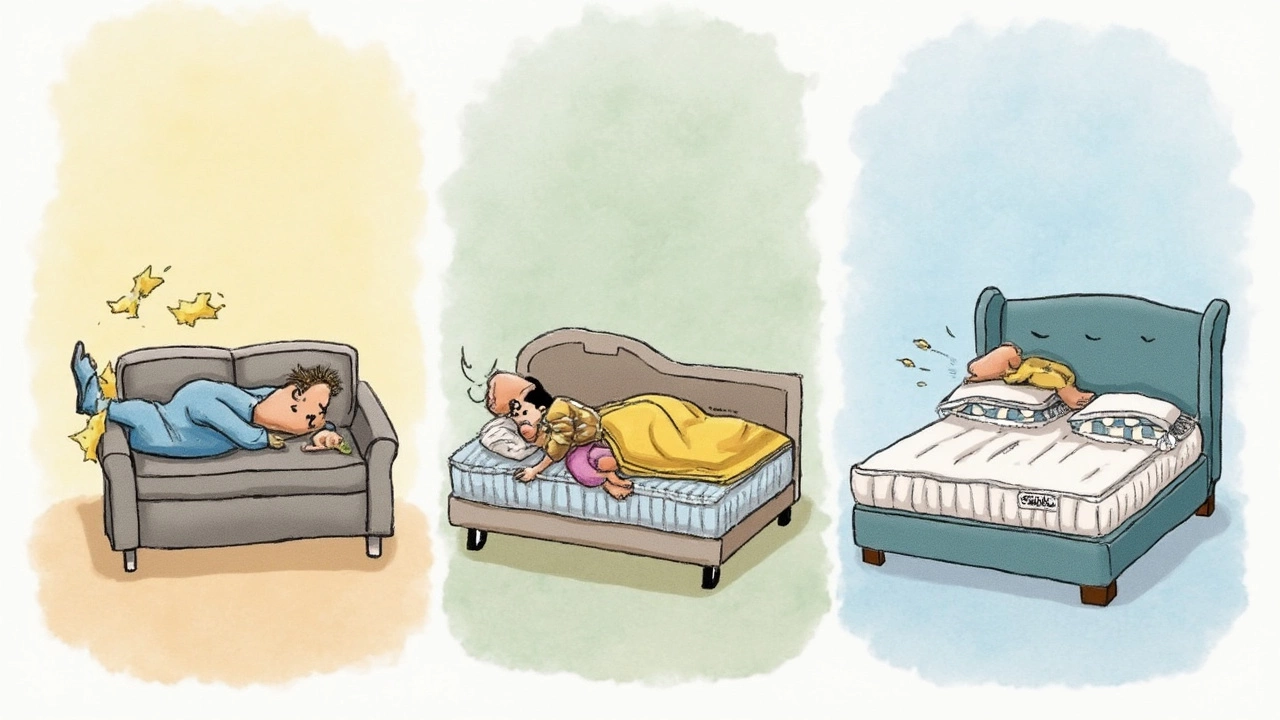 8
Apr,2025
8
Apr,2025
You know how it is. You're flipping through TV channels, fighting droopy eyelids, and before you know it, you're waking up to the droning sound of an infomercial. The couch is great for those unexpected nap times! But, what if the couch becomes your all-the-time bed? Let's dig into whether that's a smart idea.
First off, consider comfort and support. Couches are designed for sitting, not sleeping. Most don’t offer the support your back needs overnight. You might start to feel aches in places you didn’t know could ache. Your sleep quality can also take a nosedive. It's not just about feeling groggy the next day—you're also missing out on those deep sleep cycles that keep you sharp and cheerful.
- Comfort and Support
- Impact on Sleep Quality
- Health Considerations
- Sofa Beds as an Alternative
- When Couch Sleeping Works
- Practical Tips for Couch Sleepers
Comfort and Support
When it comes to snagging a good night's sleep, the level of comfort and support you get matters way more than you'd think. Sure, your couch is a cozy spot for Netflix binges, but its design isn't quite up to the snuff for nightly snoozing.
The main issue? Couches just aren't built like beds. A sofa typically has cushions meant for sitting, which means the padding might be a bit firm or uneven for laying out all night. Over time, this can mess with your back and spine alignment, leading to aches and pains. Ever woke up feeling like an old rusty tin man? That's what we're talking about.
Another thing to consider is the space on the couch. Most couches are about 2.5 to 3 feet deep, whereas even a twin bed gives you more room to stretch out. Feeling like a sardine isn't anyone's idea of cozy, right?
Plus, let's chat about those cushions. Unlike mattresses, sofa cushions vary in depth and firmness. This can mean your hips or shoulders might sink lower than you'd like, throwing your body into an awkward position. Talk about comfort problems that disrupt your long-term sleep quality.
- Pro-Tip: If you’re stuck with couch sleeping, consider adding a padded mattress topper. It won't work miracles, but it'll definitely help out.
- Rotate your position every couple of nights to avoid putting too much pressure on one area of your body.
These are just a few reasons why using the couch for sleep might leave you feeling less rested. Not convinced? You could always try a dedicated sofa bed, which often has better design features for sleepers. But, more on that a bit later.
Impact on Sleep Quality
Let's get real about what happens when you regularly hit the couch for your night's sleep. While couches might seem snug at first, they often can't match the quality of sleep you get from a proper bed. Why? It mostly comes down to support, or rather, the lack of it.
A comfy couch can do wonders for an impromptu nap, but every night? Not so much. Traditional mattresses are designed to support your body's natural curves, helping you move through the various stages of sleep. Couches, on the other hand, often fall flat—literally. This can lead to broken slumber as you spend more time tossing and turning trying to get comfortable.
A study from the Sleep Health Foundation warns that lack of quality sleep can lead to daytime fatigue and even memory problems. They say,
“A consistent, good night's sleep is crucial for mental and physical well-being.”
By routinely catching Z's on the couch, you may also miss out on deep sleep, the restorative phase that helps you wake up feeling refreshed. That's tough to achieve when your body is screaming from being bent out of shape.
In terms of statistics, consider this. A survey of 2,000 adults suggested that those who slept on a couch more than a mattress reported a 30% increase in sleep disturbances. If that's not enough to make you rethink your couch sleeping habits, I don't know what will!
So, if your sleep quality feels off lately, your couch could be the culprit. Trading it for a sofa bed might not just be about comfort, but actually improving how well you sleep and, in turn, how great you feel during the day.
Health Considerations
If you're thinking about making the couch your main sleeping spot, it's worth thinking about your health. Unlike a bed, a couch doesn't offer the same level of support and comfort. This can lead to back pain or stiff joints. You might start noticing discomfort in your lower back or neck more often than not. That's because sofas are built for lounging, not for a full night's sleep.
Sleeping on a couch can mess with your sleep posture. Most couches are a bit too short for the average person, so your legs hang off awkwardly or your spine twists into shapes it's not supposed to. Over time, this can lead to more serious issues like chronic back pain.
There's also something called sleep hygiene, which likely gets worse on a couch. Couch cushions collect dust mites and allergens. They aren’t made from allergen-resistant materials like a good mattress would be. If you're prone to allergies, sleeping on a couch might lead to more sniffles or even trouble breathing through the night.
Did you know that sleep affects heart health, too? Poor sleep can raise your blood pressure and increase stress levels. If your sleep on a couch isn't restful, over time, you might find yourself experiencing these health issues. It's always better to aim for a full night's rest on a proper bed if you can.
| Factor | Impact on Health |
|---|---|
| Back Support | May cause back pain |
| Posture | Leads to poor alignment, potential joint pain |
| Allergens | Can trigger allergies |
| Sleep Quality | Influences overall health, including heart health |
So, while the couch might seem like a convenient place to crash, think about how these health considerations could play out in the long run. Maybe it's time to look into a sofa bed if space or budget makes a full-size bed tricky.

Sofa Beds as an Alternative
If your couch is starting to feel like a questionable sleep choice, you might want to look into sofa beds. These handy pieces of furniture can switch from a couch to a bed in just a few steps, making them super practical, especially if you're short on space.
One of their best perks is how they combine comfort with functionality. Unlike your regular couch, sofa beds are designed with sleeping in mind. They've got better support for your back, which can help you avoid those nagging aches and sleepless nights.
Now, if you're thinking about alternatives, compare these options:
- Pull-out sofa beds, which have a hidden mattress inside. They typically offer the closest thing to a real bed experience.
- Futon-style sofa beds, which simply fold down into a flat sleeping surface. They’re usually lighter and easier to move around.
- Daybeds, which blend the look of a bed with the seating comfort of a sofa. They can be a stylish addition to any room.
Here's a quick look at how sofa beds stack up compared to regular couches:
| Feature | Sofa Bed | Regular Couch |
|---|---|---|
| Back Support | Good | Poor |
| Space Saving | High | Medium |
| Durability for Sleeping | High | Low |
Remember, if you're leaning towards making your bed out of a sofa bed, investing in a quality one makes all the difference. Check the mattress quality - memory foam can be a great choice for support and comfort. Plus, you’ll want to ensure the mechanism for folding and unfolding is smooth and easy to use. Your future self will thank you for the great sleep!
When Couch Sleeping Works
So, when is it actually okay to make the couch your nightly bed? Well, it might not be all bad in some situations. If you're couch surfing at a friend's or crashing for a night or two, then sure, it works. Plus, there are folks who say a firm couch helps with back pain, especially those who find mattresses too soft. Remember though, this isn't for everyone.
Short-term sleeping isn’t the same as settling in for the long haul. Still, some people find the smaller space reassuring, cutting out the sprawling that'll leave you searching for pillows lost in the depths. Others might be swayed by the perfect room temperature or the TV is unbeatable for a lullaby. As Dr. Michael Breus, a sleep specialist, noted in his blog, 'It's about creating comfort, whatever that looks like for you.'
"The key to good sleep is consistency. If your couch feels better than your mattress, it may not be the couch that's the problem."
- Temporary solution: If you're moving or redecorating, a couch is a decent short-term fix.
- Small spaces: Studios or one-bedroom apartments might make a cozy couch an efficient choice.
- Back pain relief: Though uncommon, some with lower back issues find solace in a firmer couch.
If you're in any of these situations and it's working out alright, more power to you. But weigh it against other factors like long-term health and comfort!
Practical Tips for Couch Sleepers
If you’re set on making the couch your snooze station, there are a few tricks to making it a cozier experience without wrecking your back. Here’s the lowdown on sprucing up your couch slumber session.
Firstly, think about adding some cushioning. Since couches aren’t exactly built with a full night's sleep in mind, adding a mattress topper or even a thick comforter can make a huge difference in comfort and support. This little upgrade can help mimic the feel of a proper bed and can be stored away during the day.
- Couch Size Matters: Make sure your couch is long enough for you to stretch out fully. Nothing disrupts sleep like waking up to adjust your position every hour.
- Pillows Play a Role: Don’t skimp on good quality pillows. Opt for ones that offer solid neck support. Sometimes mixing different pillow densities can help keep things comfy.
- Keep Bedding Handy: Have a set of sheets and a blanket dedicated just for couch sleeping. It saves time and adds a layer of comfort to your nightly routine.
Temperature is another factor often overlooked. Couches tend to be stationed in rooms that might not have the same air conditioning as your bedroom. Use a fan or keep windows slightly open to regulate the room temperature for better sleep.
In case you’re sharing your living space with others, invest in a good sleeping mask and earplugs. This will help block out light and noise disturbances—common in multi-use spaces like living rooms.
Taking care of your sleep quality is crucial. If you notice recurring aches or more tired mornings, it might be worth investing in a sofa bed. Think of it as the couch’s better sleeping-equipped cousin. Sofa beds come with mattresses built-in, often providing a better balance between couch lounging and bed sleeping.




